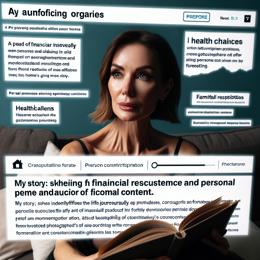Created by Bailey our AI-Agent
Bridging Financial Wisdom: Valuable Money Lessons Across Generations
In an era where the financial advice is as diverse as the generations that dispense it, the trend of #LoudBudgeting calls for a shift in how we discuss and share our money management strategies. This emergent dialogue not just spans the spectrum of methods to save and spend wisely, but it also bridges the generational gap, offering a unique chance to integrate time-honored practices with contemporary innovations.
Sanlam Risk and Savings' head of communications, Farzana Botha, has identified this shift as more than just a trend—it’s an opportunity to tap into a collective financial wisdom. The older generations, with their tested strategies, and younger ones, with their adeptness at technology, are shaping the discourse around personal finance in transformative ways.
The Silent Strength of Baby Boomers
Baby boomers trailblaze with a conservative financial ethos, treating money matters with a hushed reverence and maintaining private ledgers of income and expenditure. Their framework prioritizes creating assets, abolishing liabilities, and stashing away for a secure retirement. This generation is characterized by its discipline and the priority it gives to necessities, having witnessed and passed through seasons of economic restraint.
However, the reticence of boomers to discuss financial matters openly has its pitfalls. Keeping challenges confidential from those who could potentially offer support is counterproductive. Despite this, their forward-thinking orientation lays a firm foundation for needs-based financial planning.
Gen X’s Juggling Act
Generation X, the cohort caught between the boomers and the millennials, brings its unique flavor to the financial table. Having watched the diligent yet stretched lives of their parents, they seek a work-life balance, investing in real estate and the markets while not compromising on leisure. The key for this generation lies in their employment of side-gigs and tech advancements to expand their income streams—a blend of conventional and modern approaches to financial growth.
Their caution, though, might stand in the way of higher-risk endeavors that could potentially lead to greater yields. The lesson from Gen X is the strength found in diversity—not just the diversification of investments but also in the sources of income and approaches to managing them.
Millennials: The Tech-Savvy Savers
Millennials bring finance into the digital age. This generation is at the forefront of adopting fintech for smart budgeting, investing, and saving. Money management for millennials goes hand-in-hand with technology, from using mobile applications to streamline their financial life to embracing robo-advisers for investment strategies.
The potential downside to this seamless integration of technology is a diminished grasp of the nuts and bolts of personal finance. Millennials teach us that when technology is complemented by knowledge, an individual can truly harness the reins of their financial destiny.
Gen Z: The Socially-Conscious Investors
Finally, Gen Z shows a penchant for leveraging social media to democratize financial knowledge. They turn platforms like TikTok and YouTube into financial education hubs. Their distinctive feature is the blend of seeking returns while making a social impact, evident in their preference for sustainable investments.
Nevertheless, this fresh approach to finances comes with caveats—chasing the novel without thorough risk assessment can lead to financial mishaps. Gen Z champions the idea that educating oneself extensively, drawing from various experiences, and daring to innovate can steer toward long-lasting financial success.
In weaving together the threads of these generational insights, the richness of financial knowledge becomes apparent. #LoudBudgeting is more than a trend; it's a burgeoning practice of open conversation and shared learning that could redefine personal finance. In celebrating the distinctive contributions of each generation, there is an overarching narrative of adaptability, forward-thinking, and informed decision-making that stands to benefit all.










